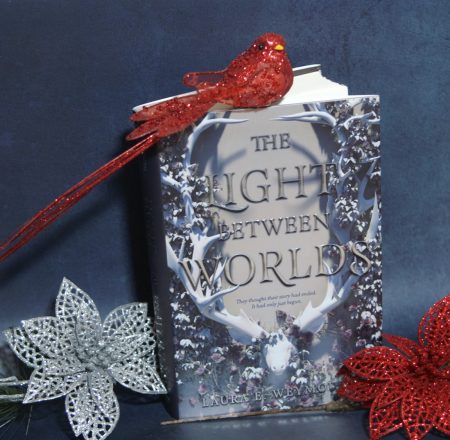
Callum Quinn, © 2021
The Light Between Worlds
By Laura E. Weymouth
The (a) story follows three siblings—Jamie, Philippa, and Evelyn—who were taking refuge in a bomb shelter when they were magically transported to a beautiful place called the Woodlands. There, they helped a host of mythical and magical creatures defeat a wicked tyrant, and spent several blissful years afterward living far away from their own war-torn world.
And then they came back. Back to the very moment they left, down to the falling bombs, the dank shelter, and their younger bodies.
But they never forgot.
Now Phil and Jamie just want to move on with their lives. But Evelyn, the youngest of the three, longs with all her heart to return to the Woodlands—the only home she’s ever really known. And while Evelyn struggles with her longing, trying to find some sense of self in a world she will forever feel out of place in, her elder sister looks on helplessly. And as time moves on, it becomes clear that both Philippa and Evelyn are in great danger of losing themselves between the pull of two different worlds.
The (A) story is a gut-wrenching tale of grief and its powerful reach. Evelyn’s depression is deeply rooted in something she cannot control, rendering her nearly hopeless and oftentimes devoid of emotion altogether—merely walking through her day to day life in a daze. She feels alone in her longing, certain that her brother and sister have been able to move on while she cannot; she drifts away from those closest to her and even, on occasion, falls deep enough into her sadness to find relief in self-harm.
But the pain is not simply localized to Evelyn. Philippa, her sister and her closest companion, is the only one who knows what their departure from the Woodlands is truly costing her sibling. And while she just wants to move on in the world she was born in, the weight of trying to keep her little sister whole is forever pressing on her shoulders and fragmenting her own happiness. Her heart breaks for Evelyn in the worst of times; and while she watches her sister deteriorate, Philippa laments the decision to bring Ev home when it was painfully clear where she truly belonged.
The grief Evelyn feels spreads like the threads of a spider’s web to everyone who cares about her—not only her sister, but her brother, her parents, the young man she manages to develop a relationship with, and even her friends and teachers at school. They share in Philippa’s helplessness as everything they attempt to do for Evelyn either fails or makes things worse until, finally, they drift away in defeat.
But for as much as this story deals with grief, there is a silver lining—a suggestion of the importance of holding on to hope. We see this briefly in Evelyn, finally set in her resolve to return to the Woodlands, and we see faint flickers of it in Philippa, as she returns to London to be with her family during a time of hardship, and finds work that she enjoys and even finds romance with a co-worker. Hope lingers in the background as bits and pieces of Philippa’s life manage to come together in ways they never did for Evelyn. But that hope still lingers beneath mountains of guilt and grief, as Philippa continues juggling the idea that, just maybe, her sister has found her way home at last—even as all the signs around her suggest otherwise.
This book immediately caught my interest when I learned its premise: a somewhat cynical commentary on the Pevensie children’s adventures in Narnia. I was curious to see which direction the author would take this alternate perspective of the story, because I had so often contemplated the cruelty of sending children home again after they’d grown up and lived entire lives in a beautiful, magical world of their own.
I instantly sympathized with Evelyn, knowing too well the grief and helplessness of longing for another world—both as an avid reader and long-time creator of my own magical and far-off worlds. But I also understood the exasperation and equal helplessness of those around her, watching her fade away as she seemingly does nothing to help herself; basically, the entirety of this book made me balance that fine line between frustration and pain as both sisters’ stories came together.
I cannot say much more about The Light Between Worlds without giving away too many important details. All in all, it is a beautifully heartbreaking look at depression and how unbeatable it sometimes seems for those who suffer from it. It also, I am certain, speaks for those of us who have grown up with the same longing in our hearts as Evelyn—but fortunately (or unfortunately—however you might see it) have not had the privilege of knowing what we’re missing.





